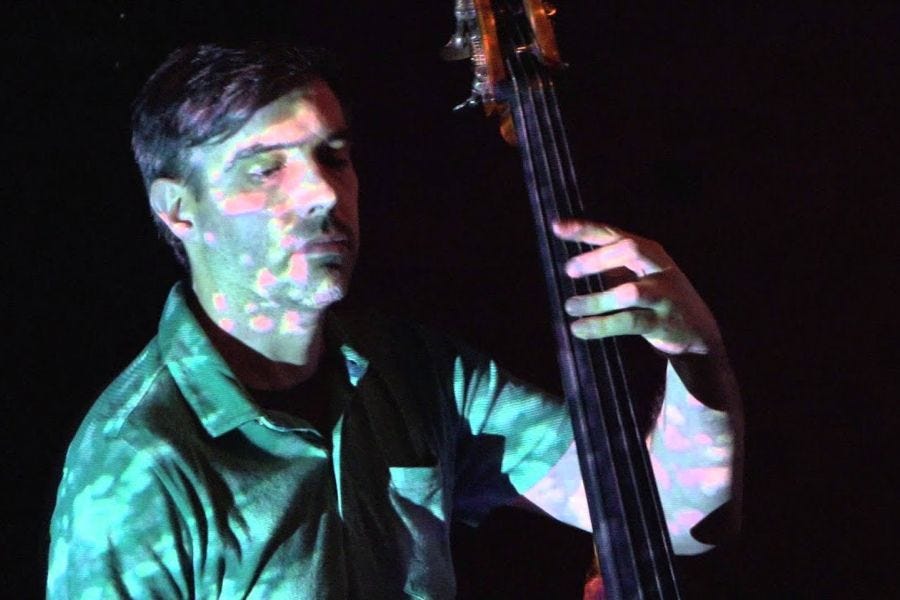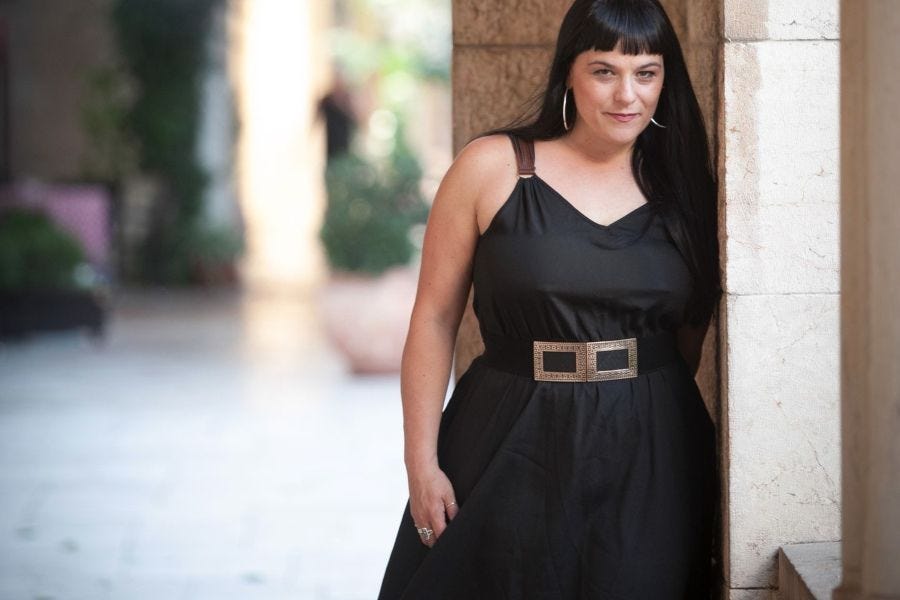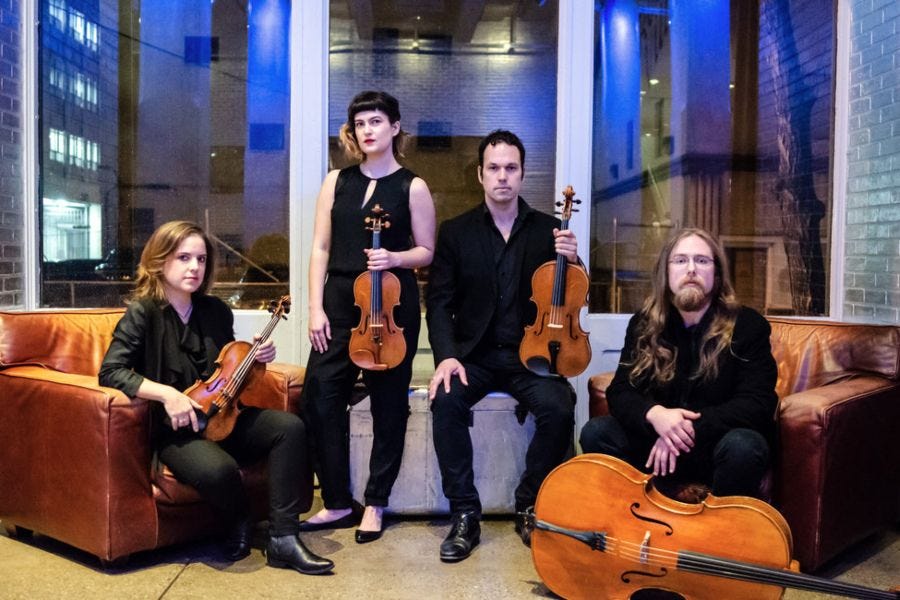Giving Thanks 2: Acknowledgement.
A hearty message of gratitude from a humbled writer, plus news tips, streaming picks, and a Video of the Week featuring an extensive Jessica Pavone piece for strings and soloists.
Prelude
I started last week’s Night After Night by expressing gratitude to the readers who’d signed up to receive this newsletter. And then this happened…


I first met Alex Ross in 1993, or maybe it was ’94. He was a critic for The New York Times, and recently had notched his first New Yorker byline; I was freshly arrived in the New York City area, a former (I thought) freelance journalist employed as a junior publicist at a classical record label and distribution company in Long Island. Alongside my new supervisor, I met Alex and Terry Teachout in separate meetings on the same day.
It was a lot to take in.
In the years since, Alex has become a colleague, and a friend. But never have I forgotten that he’s among the most gifted writers I’ve ever known: a fair, honest, judicious critic with an uncanny knack for vivid description, and a compelling storyteller who compiles, interprets, and synthesizes far-flung sources to make history not only present and relevant, but personal and compelling. The Rest Is Noise, Alex’s breakthrough first book, warranted the lavish acclaim it garnered; Wagnerism, his newest, is mined from the same rich lode of imagination and insight.
Alex also is among the most decent, kind, and generous people I’ve had the privilege of meeting, in or out of the business. If I’ve helped to bring anything to his attention over the years, then I’m glad to have made some small contribution to his erudition and joy.
I wonder whether New Yorker readers understand how fortunate they are to have a critic who, after more than two decades on the job, remains animated by curiosity and driven by discovery? Read Alex's latest column – about orchestras and other large arts institutions that have transitioned successfully to producing art for, and distributing it to, a pandemic-isolated audience – and you’ll see what I mean.
To those of you who signed on after Alex urged attention last week, if you’re curious about who I am and where I’ve been, I’ve just updated the About page on the original Night After Night blog I started 15 years ago (very much inspired by Alex’s The Rest Is Noise page), which otherwise serves chiefly now as my professional archive and a home for my diaristic weekly Playlist.
Welcome! I’ll try to make sure this is worth your bandwidth.
Here Is the News

Newly announced: Stream Fest, coming up Dec. 17-20, is a four-night series mounted by the Infrequent Seams record label in conjunction with Washington, D.C. presenter Rhizome DC. The series is built around artists and ensembles who’ve recorded for the label, though not exclusively; you’ll see and hear bassist, composer, and label head James Ilgenfritz, Elliott Sharp and Janene Higgins, Object Collection, String Noise, Red Desert, Bop Kabbalah+Voices, Ensemble Consensus, James Moore and Elliot Simpson, and more. The concerts will be streamed on Twitch and mirrored on YouTube and Facebook, Dec. 17-19 at 7pm and Dec. 20 at 6pm (all EST). All events are presented free of charge, and you can see who’s playing when via the Infrequent Seams Bandcamp page.
Speaking of Bandcamp, remember that this Friday, Dec. 4, is a “Bandcamp Friday,” during which the wildly popular online music sales site (and recently inaugurated live-streaming platform) waives its fees for 24 hours starting at 3am EST, in order to direct more funds to the artists and indie labels who need it most in a year when public concerts have dwindled to nothing. No word yet regarding whether the initiative will be extended into the New Year, but there’s no denying the good it’s done for many this year. I’ll have some choice suggestions for your shopping delectation in Friday’s “For the Record” update, so watch this space.
Classical-music industry bible Musical America has announced its 60th annual awards, this year eschewing standard categories (Composer of the Year, Ensemble of the Year, etc.) in favor of something more in tune with the times. I had the privilege and pleasure of writing about contemporary-opera producer Beth Morrison, founder of the invaluable Beth Morrison Projects, as one of three luminaries designated “Artist of the Year: Agent of Change.” The other two are mold-breaking singers Jamie Barton and Julia Bullock, and pianist Igor Levit is named Recording Artist of the Year. Most Musical America articles live behind a paywall, but these profiles are accessible to everyone. An awards ceremony, also open to the public, will be presented on Facebook Live this Sunday, Dec. 6, at 4pm EST; details are available here.
Announced on Wednesday: Jazz Standard – cited regularly during my stint writing and editing for Time Out New York as the city’s best-booked jazz club – will not reopen at its present location on East 27th Street. In the latest refrain of a too-familiar ballad, both the club and Blue Smoke, the celebrated Danny Meyer BBQ joint upstairs, have succumbed to a combination of pandemic strictures, income loss, and stalled rent renegotiation. Blue Smoke will carry on in Battery Park City, and a growing buzz seems to indicate that Jazz Standard might return elsewhere. Still, this is one more little piece of the city’s cultural history gone for good—and for some of us, it’s personal…
 Just awful news. Not only did I see many excellent shows (and eat many excellent meals) at @JazzStandardNYC, but it also was the site of my actual first date with @iveheardworse. It'll always have a place in my heart.It is with great sadness that we, along w/ @BlueSmokeNYC, share that our doors on 27th Street will remain permanently closed. The current situation surrounding COVID and #livemusic regulations precludes us from maintaining our quality & continuing to "set the standard". @USHGNYC https://t.co/rvFbey8F26
Just awful news. Not only did I see many excellent shows (and eat many excellent meals) at @JazzStandardNYC, but it also was the site of my actual first date with @iveheardworse. It'll always have a place in my heart.It is with great sadness that we, along w/ @BlueSmokeNYC, share that our doors on 27th Street will remain permanently closed. The current situation surrounding COVID and #livemusic regulations precludes us from maintaining our quality & continuing to "set the standard". @USHGNYC https://t.co/rvFbey8F26 Jazz Standard @JazzStandardNYC
Jazz Standard @JazzStandardNYC
The classical-music team at The New York Times has shared its Best Classical Music of 2020 package online, with contributions from chief critic Anthony Tommasini, classical-music editor Zachary Woolfe, senior staff editor Joshua Barone, and freelance contributors Corinna da Fonseca-Wollheim, Seth Colter Walls, and David Allen. The package is thoughtful, entertaining, heartfelt, and provocative, with citings of contemporary music not limited to a sole contributor but scattered throughout. Discuss…
More than a year has passed since Tanya Tagaq, the electrifying Canadian Inuk singer and composer, called out composer Caroline Shaw and vocal ensemble Roomful of Teeth for cultural appropriation and worse in a series of incendiary Twitter posts. At issue was what Tagaq identified as Shaw’s use of an Inuit “Love Song” without credit or compensation in her Partita for 8 Voices, which won the Pulitzer Prize. (Shaw and the ensemble, to their credit, took steps immediately to address their missteps.) Now, Andrew Mellor, a Copenhagen-based journalist and critic, has recounted the saga with a much needed depth and context. Published by the Danish webzine Seismograf, “A song of one’s own” reaches back to Tagaq’s groundbreaking collaboration with the Kronos Quartet, and further to Paul Simon’s South African expedition on Graceland, to illustrate this still-vital conflict better than anything I’ve seen previously. Significantly, Mellor ends by directing attention to Inuk singers themselves.
Video of the Week
Since live performance is off the table for now, violist and composer Jessica Pavone has gone straight-to-video with her newest opus, Lull. Widely known for her work in bands led by Anthony Braxton and her freewheeling singer-songwriter duo with guitarist Mary Halvorson, Pavone creates unaccompanied viola music that embraces the physical challenge of wrangling a too-large instrument, as well as ensemble works that luxuriate in the grit, grain, and purr of massed strings, wooden vessels, and communal motion.
Lull, one of Pavone’s most extensive pieces, wraps two outer movements for a doubled and deepened version of her string ensemble around a central concerto for two idiosyncratic soloists, trumpeter Nate Wooley and percussionist Brian Chase. Set aside 48 minutes some time soon and listen, carefully.
Stream On
All times listed at Eastern Standard Time.
Mivos Quartet
Available now
The reliably excellent Mivos Quartet – violinists Olivia de Prato and Maya Bennardo, violist Victor Lowrie Tafoya, and cellist Tyler J. Borden – has kept busy during the quarantine months, though like most artists and ensembles the action is happening online. The group recorded its newest program for the Bronx Community College’s GML Rotunda Concert Series, in which it has participated for the last three seasons. The program includes Luminous Animal (2020) by Michaela Catranis, Linda Catlin Smith’s String Quartet No. 6 (2013), and String Quartet 2.5: “Playing with Seeds” (2017) by George Lewis—the first and last of which were commissioned expressly for Mivos. For the record, I started my day with this video, and look forward to revisiting it soon. (Free; youtube.com)
Chamber Music Society of Lincoln Center
Thursday, Dec. 3, 7:30pm
New Milestones, the latest contemporary-music initiative from the Chamber Music Society of Lincoln Center, mixes archival video with freshly recorded works. Tonight’s debut episode, “Transitions (Endurance and Evolution),” surrounds a 2015 account of Helen Grime’s Aviary Sketches (after Joseph Cornell) with two new performances: cellist Mihai Marica plays Trevor Weston’s Shape Shifter, and violinist Kristin Lee and pianist Orion Weiss pair up for Zosha di Castri’s Sprung Testament. You can view the program and read the notes, by Paul Griffiths, here. Di Castri, Lee, and Weiss, you might recall, recently participated in the initial episode of another new Society series, Composers in Focus, which invites audience members into a Zoom conference among composers and interpreters; the next episode, scheduled for Thursday, Dec. 10, pairs composer Tania León with oboist James Austin Smith for a conversation, and includes a preview of her 1986 work Per la Par as played by Weiss and percussionist Ian David Rosenbaum. (Free; chambermusicsociety.org)
Ljubljana New Music Forum 2020
Friday, Dec. 4; Monday, Dec. 7; and Thursday, Dec. 10, 2:30pm
One of the genuine benefits of the present virtual music world is that you can attend a concert happening anywhere in the world, so long as you can reckon with the time difference. These Ljubljana New Music Forum concerts, curated by Czech composer Ondřej Adámek, happen at 8:30pm in Slovenia, which translates as midday here. They’re chock full of fascinating music by luminaries like Ash Fure (Dec. 4); Francesco Filidei and Carola Bauckholt (Dec. 7); and Clara Iannotta, Vinko Globokar, and Georges Aperghis (Dec. 10), as well as numerous composers whose acquaintance I’m eager to make. Two further concerts will complete the series in April. (Free; ljnmf.org)
Anne Leilehua Lanzilotti
Friday, Dec. 4, 3pm
I wrote up this event a week ago, but once again the basic facts: violist and composer Anne Leilehua Lanzilotti is releasing a new recording, Sola, on Bandcamp tomorrow, and she’s celebrating its arrival tomorrow afternoon with a matinee record-release concert—also on Bandcamp. (Doing this on a “Bandcamp Friday” definitely should test how robust the new streaming platform really is.) Her guests include cellist Andrew Yee and piano trio Longleash. ($10; annelanzilotti.bandcamp.com)
Roulette
Friday, Dec. 4; Saturday, Dec. 5; and Tuesday, Dec. 8, 8pm
It’s a busy weekend at Roulette, which has maintained its customary stream of fascinating and edifying programs throughout the fall season via livestreamed events offered free of charge. On Friday, cornetist, composer, and producer Graham Haynes improvises with percussionist Shakoor Hakeem and composer-performer Lucie Vítková. Saturday belongs to vocalist, movement artist, and filmmaker Muyassar Kurdi, who presents a new film featuring dancer Eryka Dellenbach, then performs with bassist Luke Stewart. Then on Tuesday, Sonia Belaya, a Russian-American pianist, singer, composer, and bandleader, opens a year-long Roulette residency with the premiere of Три Сестры (“Three Sisters”), in which she examines, in her own words, “the history of domestic violence against womxn in Russia.” You can sample Belaya’s personal approach to mixing art song, jazz, and folkloric sources in a previous Roulette project, Dacha, and in Mother Sparrow, a brief, poignant video directed, edited, and choreographed by the aforementioned Eryka Dellenbach. (Free; roulette.org)
###




